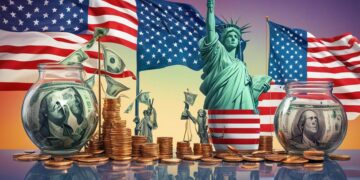The impact of the elections in the USA on the economy and investments

Understanding the Connection Between Elections and Economic Performance
The connection between U.S. elections and economic performance is a multifaceted relationship that plays a critical role in shaping the financial landscape of the country. When voters head to the polls, their choices have far-reaching implications, particularly for businesses and investors. Each election cycle poses a unique set of challenges and opportunities based on the political climate at the time.
One significant factor to consider is political stability. Investors typically favor a predictable political environment because it allows for better long-term planning and investment strategies. For instance, stable governments are more likely to implement consistent policies that foster economic growth, whereas political turmoil can lead to uncertainty and hesitation among investors. A clear example of this can be seen in the aftermath of significant political events, such as the 2008 financial crisis, when uncertainty surrounding government actions created a volatile market environment.
Another critical aspect is policy changes. When a new administration takes office, its policies can lead to significant shifts in various sectors of the economy. For example, a shift toward renewable energy may result in increased investments in solar and wind technologies if a pro-environment party gains power. Conversely, a government that favors fossil fuels may lead to lower investments in green technologies. Historical data suggest that investors often reposition their portfolios to align with expected policy changes following elections, anticipating the impact these changes will have on their investments.
The market reactions to election outcomes are often immediate and pronounced. Stock markets may rally or decline based on the perceived implications of the election results. For example, during the 2016 U.S. presidential election, the stock market initially reacted favorably to the unexpected victory of Donald Trump, with many sectors anticipating pro-business policies. However, this reaction was short-lived, demonstrating how quickly investor sentiment can shift based on new information and perspectives.
Historical Trends and Implications
Looking back at historical trends, we can observe that increased uncertainty during election years often results in stock market fluctuations. The lead-up to elections typically sees increased volatility as investors assess potential outcomes and adjust their strategies accordingly. In many cases, this uncertainty can lead to a decrease in consumer spending, as individuals become more cautious about their financial decisions.
Moreover, post-election results can set the tone for investment strategies in the subsequent year. For instance, an administration that prioritizes infrastructure spending can provide lift to construction and manufacturing stocks, while a focus on healthcare reform might benefit pharmaceutical companies. Each political platform has its distinct implications for various industries, underscoring the necessity for investors to stay informed about election outcomes and their potential economic impact.
Ultimately, as we explore the complex relationship between elections and economic conditions, it becomes essential to recognize that the implications extend beyond the political arena and into daily financial lives. Understanding these dynamics enables voters and investors alike to make informed decisions that consider not only immediate effects but also long-term trends shaped by the political landscape.
SEE ALSO: Click here to read another article
The Dynamics of Political Influence on Economic Activity
The influence of elections on economic activity can be observed through various channels that intertwine political decisions and market performance. One of these critical channels is the effect of business confidence on economic growth. When a particular party is leading in the polls or when elections are approaching, businesses often reevaluate their investment plans based on anticipated policy changes. For example, if a candidate known for tax cuts is leading, businesses may increase capital expenditures in anticipation of a favorable tax environment. This optimism can ripple through the economy, potentially leading to job creation and overall economic expansion.
Moreover, it’s essential to recognize the role of government spending in economic performance. Elections can dictate budget allocations, which in turn affect sectors such as education, infrastructure, and defense. A new administration might prioritize funding for infrastructure projects, leading to increased jobs in construction and related industries. In contrast, an administration focused on austerity measures may curtail spending, impacting economic growth negatively. The effects of these decisions are reflected in stock prices and investment flows as businesses and investors adjust their strategies based on these anticipated changes.
Additionally, the regulatory environment post-election can lead to shifts in investment patterns. Different political platforms often prioritize varying degrees of regulation. For instance, an administration that advocates for stricter environmental regulations may affect industries such as oil and gas. Investors in these sectors may see decreased profits and may choose to reallocate their funds to more favorable sectors, such as renewable energy. This adaptation to regulatory changes illustrates the sensitivity of markets to the political climate.
Key Factors Influencing Economic Impact
To better understand the economic implications of elections, it’s helpful to consider several key factors that influence investors and markets:
- Election type and stakes: Presidential elections generally have a larger impact on financial markets compared to midterm elections or local races. The stakes are perceived as higher when voters are choosing the head of state.
- Control of Congress: The balance of power in Congress can significantly affect how effectively a new administration implements its policies. If one party controls both the presidency and Congress, it is more likely that proposed policies will be enacted.
- Market sentiments: Investor emotions can dramatically shift in response to elections, leading to market rallies or declines. These sentiments are often driven by media portrayals, party platforms, and public opinions.
- Historical precedent: Investors often look back at historical patterns to guide their expectations. For example, traditionally, stock markets have tended to perform differently under Democratic and Republican administrations, affecting investor strategies.
By highlighting these factors, it becomes clear that the impact of elections extends far beyond the political realm and plays a pivotal role in shaping economic conditions. Understanding this connection can empower voters and investors alike to make more informed decisions in navigating the complexities of the U.S. economy during election cycles.
SEE ALSO: Click here to read another article
Market Reactions and Investment Strategies During Election Cycles
As elections loom on the horizon, investors often adjust their strategies in anticipation of potential shifts in government policy. Market reactions can be immediate and significant, with stock prices fluctuating based on perceived electoral outcomes. For instance, during the 2016 presidential election, the financial markets experienced volatility as polls shifted, reflecting the uncertainties surrounding the election of Donald Trump. Investors rapidly reassessed their portfolios, weighing the implications of potential tax cuts and deregulation against the risks of trade policy changes and geopolitical instability.
Another important aspect to consider is the concept of the political risk premium. This refers to the additional potential for loss that investors perceive during uncertain political times. When legislative agendas may shift dramatically post-election, investors often demand higher returns on investments in order to compensate for increased risk. This can lead to higher borrowing costs as corporate bonds may require higher yields to entice buyers, ultimately influencing companies’ investments and operating costs.
Furthermore, elections often lead to shifts in interest rates. Depending on which party gains power, the Federal Reserve may adjust monetary policy to align with new fiscal objectives. For example, if a pro-growth administration prioritizes aggressive infrastructure spending and deregulation, the Federal Reserve might consider raising interest rates to prevent the economy from overheating. Conversely, if a new administration pursues contractionary policies, lower interest rates could be on the table to stimulate investment. These shifts affect investor decisions, impacting everything from mortgage rates to corporate financing.
Sector-Specific Impacts and Opportunities
The repercussions of elections extend beyond mere market fluctuations; they can lead to substantial changes in specific sectors. Certain industries may benefit significantly from an administration’s policies. For example, the healthcare sector could see investment opportunities or drawbacks depending on policy frameworks regarding healthcare regulations and support for public health initiatives. Likewise, the energy sector’s fortunes may change based on whether an administration favors fossil fuels or renewable sources. A political commitment to combating climate change could lead to increased investment in solar or wind energy, presenting lucrative opportunities for forward-thinking investors.
- Technology and Innovation: A government that incentivizes research and development through grants and tax breaks can spur innovation in technology, leading to a surge in tech stock investments.
- Real Estate: Changes in property tax regulations can create a shift in real estate investments. For instance, a new administration that favors urban development could lead to increased demand for urban properties.
- Defense and Aerospace: Elections can result in budget increases for defense sectors, thus attracting investors looking to capitalize on increased government contracts.
These sector-specific dynamics illustrate that understanding the political landscape not only aids in comprehending the broader economic impact but also helps investors identify strategic opportunities that can arise during election cycles. As firms adapt their strategies according to political forecasts, informed investors may find themselves at a significant advantage, wielding insights that could lead to fruitful outcomes in their portfolios.
SEE ALSO: Click here to read another article
Conclusion
In summary, the impact of elections on the economy and investments in the United States is profound and multifaceted. As we’ve explored, the lead-up to an election can create notable market volatility, with rapid investor adjustments in response to anticipated policy changes. Understanding the political risk premium allows investors to navigate uncertainties and better manage their portfolios during these crucial periods.
Moreover, the shifting landscape of interest rates based on party control underscores the importance of keeping a vigilant eye on monetary policy signals. An informed investor can leverage these dynamics to make strategic decisions that align with their financial goals. The divergence in sector-specific impacts—ranging from technology and real estate to healthcare and renewable energy—further emphasizes the need for a tailored approach to investing. The right investment strategy in response to political changes can yield significant advantages.
Ultimately, elections are not merely about choosing leaders; they are pivotal moments that can reshape the economic environment. Observing how government policies evolve provides valuable insights into potential opportunities and challenges. As we look ahead to future elections, staying informed and adaptable will be key for investors seeking to thrive in a landscape shaped by political decisions. By viewing elections through an economic lens, investors can better position themselves for success in an ever-changing marketplace.

Beatriz Johnson is a seasoned financial analyst and writer with a passion for simplifying the complexities of economics and finance. With over a decade of experience in the industry, she specializes in topics like personal finance, investment strategies, and global economic trends. Through her work on World Information, Beatriz empowers readers to make informed financial decisions and stay ahead in the ever-changing economic landscape.





